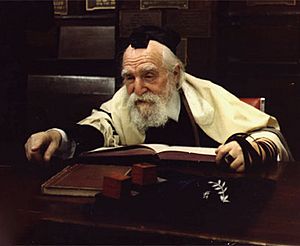Rabbi facts for kids
| Part of a series on | |||
|---|---|---|---|
|
|||
| Judaism | |||
| Category | |||
| Jewish religious movements | |||
| Orthodox (Haredi • Hasidic • Modern) | |||
| Conservative • Reform | |||
| Reconstructionist • Renewal • Humanistic | |||
| Jewish philosophy | |||
| Principles of faith • Kabbalah • Messiah • Ethics | |||
| Chosenness • Names of God • Musar | |||
| Religious texts | |||
| Tanakh (Torah • Nevi'im • Ketuvim) | |||
| Ḥumash • Siddur • Piyutim • Zohar | |||
| Rabbinic literature (Talmud • Midrash • Tosefta) | |||
| Religious Law | |||
| Mishneh Torah • Tur | |||
| Shulchan Aruch • Mishnah Berurah | |||
| Kashrut • Tzniut • Tzedakah • Niddah • Noahide laws | |||
| Holy cities | |||
| Jerusalem • Safed • Hebron • Tiberias | |||
| Important figures | |||
| Abraham • Isaac • Jacob | |||
| Moses • Aaron • David • Solomon | |||
| Sarah • Rebecca • Rachel • Leah | |||
| Rabbinic sages | |||
| Jewish life cycle | |||
| Brit • Pidyon haben • Bar/Bat Mitzvah | |||
| Marriage • Bereavement | |||
| Religious roles | |||
| Rabbi • Rebbe • Posek • Hazzan/Cantor | |||
| Dayan • Rosh yeshiva • Mohel • Kohen/Priest | |||
| Religious buildings & institutions | |||
| Synagogue • Beth midrash • Mikveh | |||
| Sukkah • Chevra kadisha | |||
| Holy Temple / Tabernacle | |||
| Jewish education | |||
| Yeshiva • Kollel • Cheder | |||
| Religious articles | |||
| Sefer Torah • Tallit • Tefillin • Tzitzit • Kippah | |||
| Mezuzah • Hanukiah/Menorah • Shofar | |||
| 4 Species • Kittel • Gartel | |||
| Jewish prayers and services | |||
| Shema • Amidah • Aleinu • Kaddish • Minyan | |||
| Birkat Hamazon • Shehecheyanu • Hallel | |||
| Havdalah • Tachanun • Kol Nidre • Selichot | |||
| Judaism & other religions | |||
| Christianity • Islam • Judeo-Christian | |||
| Abrahamic faiths | |||
| Related topics | |||
| Antisemitism • The Holocaust • Israel • Zionism | |||

A Rabbi is a respected teacher and leader in Judaism. The word "Rabbi" comes from a Hebrew word meaning "my master" or "great." It shows that the person is very knowledgeable.
Rabbis are usually people who have studied Jewish law for a long time. They learn at special schools called seminarys or yeshivas. Their main job is to teach the Torah, which is the central text of Jewish law. Rabbis also often lead Jewish communities. While they are not always needed for important life events, they often help with them.
Contents
Becoming a Rabbi
Historically, only men could become rabbis. This is still true in Orthodox Judaism. However, many other Jewish groups now allow women to become rabbis too. This means more people can take on this important role.
Rabbinic Court: The Beit Din
Three rabbis can form a special court called a beit din. This court helps solve disagreements between Jewish people using Jewish law. A beit din is also needed when someone wants to convert to Judaism. They make sure the person understands and follows Jewish traditions.
Ensuring Kosher Food
Rabbis are sometimes asked to check food to make sure it is kosher. Kosher means the food follows Jewish dietary laws. The rabbi's presence does not make the food kosher itself. Instead, they supervise the preparation to ensure everything is done correctly. When packaged food is kosher, it often has a special symbol called a hechsher. This symbol tells you the food meets kosher standards.
Images for kids
See also
 In Spanish: Rabino para niños
In Spanish: Rabino para niños
 | James Van Der Zee |
 | Alma Thomas |
 | Ellis Wilson |
 | Margaret Taylor-Burroughs |




